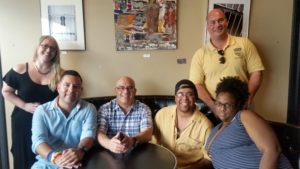Last year, a client at The Arc Mercer approached Executive Director Steve Cook to confide in him about his struggles feeling accepted in the community. It was an “aha” moment for Steve – and one that led to the creation of what is believed to be among the first initiatives that exists to meet the support needs of individuals with disabilities who identify as LGBTQ.

Tell us about the SNAP program and how it came to exist! What type of activities does it involve?
When I realized that someone we served in our agency was struggling with how to successfully integrate into the community as an LGBTQ individual with special needs, I researched other possible resources and found none really existed that comprehensively provided integrated community settings and professional counseling.
I decided The Arc Mercer would commit to developing a program that not only met the needs of someone who identified as LGBTQ with special needs, but that we would share our experiences to allow others to replicate the program.
That is basically how SNAP was formed.
How is the program helping you build a presence and connections/partnerships in your community – both with media and with other organizations?
SNAP has garnered incredible media support due to its unique status as one of the first of its kind in the nation.
As we shared this organization’s mission throughout New Jersey, and the region, we found leaders of other organizations are receiving feedback from their frontline staff about the need for LGBTQ supports for those that they serve. This has led to an incredible surge in awareness by organizational leaders about the need for this type of support.
How do you create that safe space where individuals to feel comfortable participating in the group activities?
One of our first steps was to identify staff within our organization who sympathize with, and support, the mission of SNAP.
This allowed us to build a supportive environment for those we serve to engage in community activities and dynamic professional counseling sessions (through our health care clinic) that focus on creating integrated and safe community events and professional counseling sessions (individual and group), that have evolved into a social environment for members of SNAP to thrive within.
What does the future of the program look like to you?
It is our hope that the framework of our current SNAP organization, including integrated community events, and a comprehensive counseling program (that encourages individuals, their friends and family, and others who identify as LGBTQ with special needs, to openly communicate about how they feel and their goals), will be able to be replicated throughout the nation.
Why do you think establishing groups like this is important? Do you have any advice for other chapters looking to build out programs that address traditionally underserved/under-represented communities like this?
Chapters of The Arc have always strived to find best practices and share them with other chapters nationally.
I think our experiences will allow others to build programs that create safe environments for those we support to be integrated, healthy and safe in the LGBTQ community.
My advice to any chapter looking to replicate our program is to identify those in your organization who support this mission and encourage them to organize events with LGBTQ organizations in local colleges, schools and community organizations.
More importantly, identify counseling resources to support staff, family members and those we serve who identify as LGBTQ.
This may be hard, but thanks to a suggestion by a member of The Arc’s national team (Allen Miller), we are exploring the use of telemedicine (counseling) through our Healthcare Center.
Of course, I am always available to talk directly with anyone who wants to explore forming a similar group at stevencook1@msn.com.










